What is Collagen? Collagen Benefits & Side Effects
Collagen is a trendy nutritional supplement that many are adding to their diets, but why? What is collagen? What does collagen do? What does the science and research say about collagen? Let’s dive in together to see what collagen is and what research says about collagen benefits and collagen side effects.
And as always, as I share my Vital Proteins collagen peptides review, my goal is not to tell you what to do. My job as a registered dietitian is to help break down the research and help you feel confident deciding for yourself if it’s a fit for you.
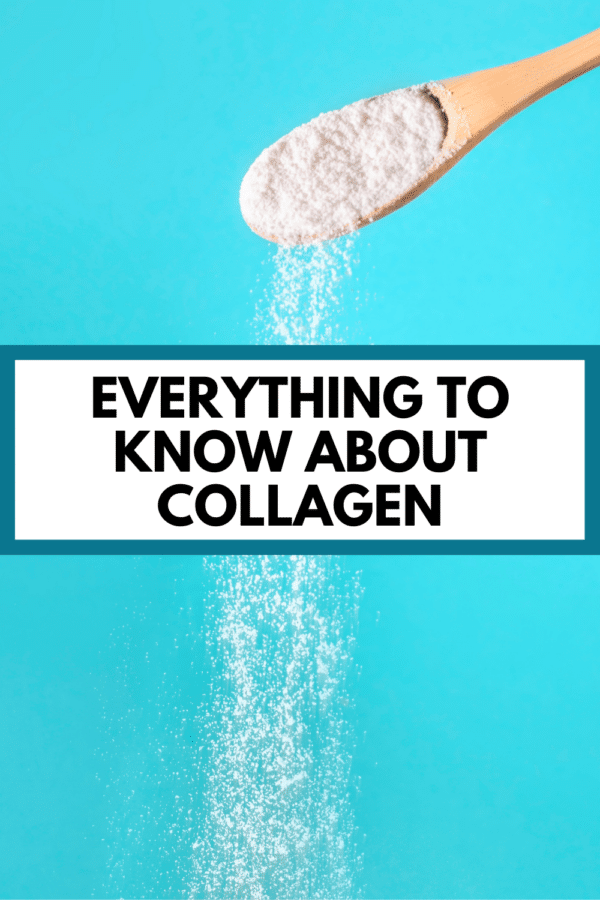
First, a reminder: While I am a registered dietitian, all blog posts I author, including this one, are for informational purposes and are never to be substituted for individual medical or nutritional advice. Please see your personal physician, dietitian, and/ or other members of your healthcare team for questions or concerns regarding your unique care.
What is collagen?
Collagen is the most abundant protein in your body, found in skin, muscles, tendons, bones, ligaments, and even teeth, blood vessels, and corneas. Collagen has many roles, from helping give your skin elasticity to providing strength in your bones.
While it contains 19 different amino acids, the predominant amino acids are glycine, proline and hydroxyproline (1). It’s also important to note collagen is not a complete protein, as it only contains eight of the nine essential amino acids.
Collagen is internally produced and repaired in our bodies. Science shows us that taking dietary collagen supplements does not directly translate to more collagen in your body. Digestion breaks collagen supplements down into amino acids that may be used to help collagen production, or may be used elsewhere in your body.
Collagen vs Collagen Peptides
Collagen is a long-chain of amino acids. Collagen peptides, or hydrolyzed collagen, is when collagen has been processed and broken down into smaller chains of amino acids. These smaller chains of amino acids are more easily absorbed by your body.
Hydrolyzed Collagen vs Collagen Peptides
Hydrolyzed collagen, collagen hydrolysate, and collagen peptides are terms that can all be used interchangeably as they refer to the same thing.
Collagen Type 1, Collagen Type 2, and Collagen Type 3
There are at least 16 types of collagen, but 80-90% of collagen in the body is from types I, II, and III (2).
- Collagen Type 1 is found mostly in skin, tendons, organs, vasculature, and bones
- Collagen Type 2 is found it cartilage
- Collagen Type 3 is found in reticulate (like a network of veins), typically alongside Type 1
While all collagen dietary supplements will differ, many are a combination of Type I and Type III, although there are some Type II-specific supplements.
Where Does Collagen Come From?
Hydrolyzed collagen peptides are made by processing animal cartilage, hides, and bones. This can be from cows, pork, chicken, or other animals and may include one source (i.e. bovine hides) or multiple (hides and cartilage). They can also be sourced from marine sources, like shellfish, fish skins, or cartilage from fish or sharks.
How is Collagen Made?
The actual processing will vary between companies but one company (Vital Proteins) notes that their process involves soaking bovine hides in hot water to remove fat, then soaking in an alkaline or acid solution, cooking in water, and then treated with enzymes to process from gelatin to collagen peptides. Then the product is dehydrated and milled to create a powdered supplement (3).
Heavy Metals in Collagen Peptides
One potential concern with collagen, and any other dietary supplements that are derived from bones, is heavy metal toxicity since animal bones contain trace amounts of toxic metals (4). One study looking at bone broth (processed similarly as collagen) showed that heavy metals, like lead and cadmium, were found in commercial bone broths but were in such low quantities that any risks were considered minimal.
Marine collagen, sourced from fish skin, can also pose a concern for heavy metal toxicity due to mercury content in different fish. However, one study in rats noted no higher chronic toxic effects in any of the test groups compared to the control group (5).
Some companies will test every lot of their collagen for different heavy metals to ensure safety in their product, so be sure to investigate before purchasing.
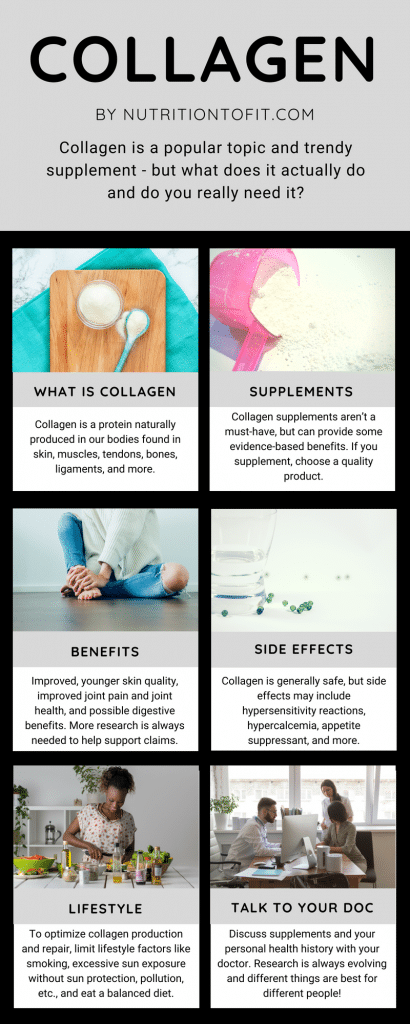
Collagen Benefits
Collagen enthusiasts anecdotally claim collagen benefits/ collagen peptide benefits for anything from improved hair, nails, and skin, to joint health, digestive health, and other various medical conditions.
Dietary supplements are not regulated by the FDA in the same way our conventional food supply is regulated, which means supplement companies are expected to evaluate the safety and labeling of their products before marketing to ensure they meet all requirements of DSHEA and FDA regulations (6). However, action against supplement companies isn’t taken by the FDA until there are complaints made and an investigation is done – basically after their product has been sold for a while.
It’s important to not base supplement purchases solely off the recommendation of a company’s marketing team, but to look at what research actually says about the product. This is exactly what the next several sections will do as we look at several areas of benefits of collagen peptides and what the research says about them.
Collagen Benefits for Hair, Skin, and Nails
Collagen benefits for skin is an area with growing research. Studies have shown emerging evidence on collagen peptides consumption leading to improvement in skin issues associated with skin aging, like facial skin moisture, elasticity, wrinkles, and roughness (7). One study showed increased keratin and keratin-associated peptides in skin (which may possibly correlate with hair benefits) (8). Additionally, one review of available research in 2015 also noted a high level of tolerance and safety, potentially making collagen peptides “attractive” for long-term use (9).
Anecdotally, many individuals also have stories about how they feel consuming collagen peptides has led to improvements in hair, skin, and nail growth and quality. More significant research is needed to support these claims and the research mentioned above. It does not mean that these individuals are not seeing benefits, it just means we don’t have enough consistent, statistically significant, concrete data that it does.
Does Collagen Help Hair Growth?
Collagen contains significant amounts of the amino acid proline, and proline is the main component of keratin. So consuming collagen does provide your body with more of the amino acids (building blocks) it needs to create hair growth.
But remember – your body is going to use the amino acids you consume wherever they’re needed most. And that may or may not be hair growth.
Plus we don’t have much for human studies on collagen’s effects on hair growth, so there’s a lot we don’t know.
Does Collagen Help Cellulite?
A 2015 study showed collagen supplementation led to less cellulite and and an increase in skin thickness.
BUT!
That is just one study. And it’s imperative to understand that cellulite is influenced by many things. Of which the biggest influence may be genetics!
Collagen Benefits for Joints
Research is suggesting that collagen may reduce and prevent joint pain and bone density loss (9). One 24-week study looked at hydrolyzed collagen as a dietary supplement to help athletes with activity-related joint pain, noting possible benefits of collagen supporting joint health, reducing joint pain that could inhibit athletic performance, and possibly reduce the risk of joint deterioration in certain individuals (10).
As with all studies, there are limitations and further studies will be needed to support findings.
Collagen Benefits for Osteoarthritis and Osteoporosis
There is a lot of interest in the topic of hydrolyzed collagen as prevention and/ or treatment for osteoarthritis and osteoporosis. One randomized, double-blind, placebo-controlled study indicated the positive potential of collagen peptide supplementation in osteoarthritis management and joint health maintenance (11).
In general, though, while there is potential for beneficial effects, current findings don’t show statistical significance in pain management and provide insufficient evidence to support collagen as a recommendation in prevention or treatment of osteoarthritis and osteoporosis (12, 13).
Collagen for Gut Health and Digestion
When collagen peptides are mentioned in conjunction with gut health and digestion, it’s often referring to the prevalence of the amino acid glycine in collagen peptides, which is thought to reduce gastrointestinal inflammation and improve digestion (14).
Studies looking specifically at hydrolyzed collagen found that long-term ingestion of collagen or hydrolyzed collagen can change the compositional rate of hydroxyproline peptides in human blood, which could possibly change protease activity in the digestive tract with beneficial effects (15).
Another study found that individuals with ulcerative colitis may see benefits from consuming collagen or collagen peptides, as treatments including collagen and collagen hydrolysate resulted in decreased mucosal damage and faster regeneration of damaged mucosa (16).
Of course, further studies are needed to support current findings and provide more clinically significant data.
Does Collagen Make You Poop?
As a dietitian, I’ve heard some say they feel collagen constipates them whereas others feel collagen makes them have to poop. So what’s going on?
If you feel collagen is constipating, you may not be consuming enough water and/ or fiber in your diet. Consuming collagen is similar to consuming any kind of protein powder/ protein, and as with everything you consume, you need to intake adequate amounts of water and fiber to keep things moving.
Anecdotally, some feel collagen helps them regulate their bowel movements.
Then there are also those who feel that consuming collagen peptides leads to side effects of diarrhea.
You also need to ask if you’re having an issue with the collagen peptides itself, or are there other ingredients you could be reacting to?
At the end of the day, we have no where near enough research on collagen’s effects on bowel movements to make any sweeping conclusions. Additionally, not everyone is going to react the same. If you’re noticing unwanted effects, absolutely discontinue use and speak to your physician.
Collagen Side Effects
While many studies recognize collagen as a generally safe ingredient, there are a few potential side effects to be aware of.
- Hypercalcemia: high calcium levels may occur in some individuals, due to high concentrations of calcium, particularly in some sources of marine collagen, like shark cartilage (17). Be cautious especially if simultaneously taking any calcium supplements.
- Hypersensitivity reactions: be sure to check the source of your collagen – if you’re allergic or sensitive to the collagen source (i.e. cow, shellfish, fish), you’ll likely have reactions to that collagen as well.
- Bad taste in mouth: while many, many collagen peptide supplements are unflavored and consumers report no discernable difference in taste, some individuals may experience a bad taste in their mouth following consumption.
- Appetite suppressant: depending on the individual this may be a side effect or a benefit. Studies have shown gelatin and collagen to increase satiety, which can also impact appetite and intake at later meals (18, 19).
Anecdotally, some individuals have reported other side effects including constipation, bone pain, fatigue, and heart arrhythmia. Be sure to discuss your individual health history and potential side effects with your healthcare provider before starting supplementation.
Do You Need to Supplement with Collagen?
Collagen supplementation is not necessary. Our bodies naturally produce and repair collagen on their own. Collagen supplements consumed orally do not directly correlate to increased collagen stores.
Some emerging research suggests potential benefits associated with collagen supplementation and that it’s generally seen as safe. More research is always needed to further substantiate existing and explore additional evidence.
There are other lifestyle factors you can also focus on to support your body’s natural collagen production and repair:
- Reduce exposure to free radicals.
- Limit excessive sun exposure without sun protection.
- Stop smoking.
- When possible, limit exposure to pollution.
- Focus on a healthy lifestyle with plenty of water, amino acids, antioxidants including lots of Vitamin C-rich fruits and vegetables, and other anti-inflammatory foods, such as omega-3s found in salmon.
Overview of Collagen Supplementation
- Collagen is a protein naturally produced in our bodies but can be produced from animal and marine sources as a dietary supplement.
- Collagen peptides is collagen processed into smaller, more easy to digest and absorb pieces.
- Potential research-based collagen benefits include skin, hair, and nail health, joint health, and gut health.
- Potential collagen side effects include hypersensitivities/ allergic reactions, hypercalcemia, bad taste in mouth, heart arrhythmias, fatigue, constipation, and appetite suppressant.
- More clinical research is needed to support current research and claims.
- You can optimize your body’s natural production and repair of collagen by consuming a variety of amino acids, antioxidants, and omega-3 fatty acids through foods like different protein sources, fruits, and vegetables.
- Avoid smoking, excessive sun exposure without sun protection, pollution, and lifestyle factors that increase free radicals to avoid faster breakdown of endogenous collagen.
- Always consult with your doctor before starting any new supplements or dietary changes to ensure it’s a good fit with your individual health history.
- If you are having any adverse effects, discontinue use and discuss with your medical provider immediately.
Vital Proteins Collagen Peptides Reviews
Vital Proteins is arguably the most heavily marketed and popular collagen peptides brand. If you’re curious about my thoughts, as a registered dietitian, here’s my Vital Proteins collagen peptides review:
- Vital Proteins produces their gelatin and collagen peptides in Brazil, where the cattle industry has even tighter regulations than in the United States.
- They strive to ensure their cattle is hormone and rBGH-free. They use Nelore breed cattle (non-dairy producing — no need for rBGH injections to stimulate more milk with non-dairy producing cattle!). There is also a Brazilian law that prevents the addition of hormones to feed.
- The pasture size for each animal is one animal per 2.67 acres and their animal standards are in alignment with the Global Animal Partnership 5-step animal welfare rating standards.
- Vital Proteins marine collagen is sourced from wild-caught, non-GMO red snapper off the Hawaiian coast.
- Their product used to only contain unflavored collagen peptides, but it’s been reformulated to now also contain hyaluronic acid and vitamin C (presumably to promote potential skin and beauty benefits).
- Their products are third party tested by NSF International, with all of their Vital Performance line being NSF Certified for Sport.
Now while this part is very subjective, I personally find Vital Proteins to have a very neutral, often even undetectable taste. I also find that it mixes very well into anything from coffees, teas, and hot chocolates to baked goods, overnight oats, chia pudding, and energy balls.
All in all, my Vital Proteins collagen peptide review? I like it. I do wish they hadn’t added hyaluronic acid and vitamin C to their original unflavored collagen peptides (while I understand why they did it, I don’t see a need for it personally – my diet has plenty of vitamin C and several of my skincare products already contain hyaluronic acid).
Collagen FAQs
What to Mix Collagen Powder With?
Collagen peptides can be mixed with water, or any beverage of your choice. They also can be incorporated into things like chia puddings, overnight oats, baked goods, and energy bars.
What’s the Best Vegan Collagen?
Well, I hate to be the bearer of bad news, but there is no best vegan collagen because collagen is not vegan.
That said, collagen is produced in all of our bodies, no matter what we eat. But eating a diet high in vitamin C and omega-3 fatty acids, plenty of fruits, vegetables, protein, and hydrating appropriately will help promote collagen production and repair!
Does Collagen Help with Weight Loss?
Does collagen help with weight loss? It depends.
Above all, weight loss stems from being a calorie deficit. You will never, ever find a food or supplement that magically makes your body lose weight.
That said, collagen does provide protein (although remember it’s not a complete protein). As a dietitian, I’ve worked with a lot of folks who find that when they prioritize balancing their meals (which for many means adding more protein), it’s easier to feel more satiated and can help in weight loss.
But again. Collagen alone will not magically make you lose weight. And as always, more studies are always helpful.
Does Collagen Make You Gain Weight?
Similar to asking if collagen can help with weight loss — it depends.
There is nothing inherently magical about collagen that would promote weight gain, either. You could gain weight while consuming collagen, but only if you’re in an overall caloric surplus.
Even More Collagen Information
Check out part 2 of this collagen series where I do a collagen Q+A and answer common questions like how much collagen you need (if any), dietary collagen sources, and how to choose a quality supplement. I also share more on my personal take on collagen as a dietitian and how I use it.
Recommended Collagen Brands
If you are considering a collagen supplement, I have personally tried the following brands of unflavored collagen peptides purchased from Amazon (affiliate links below) and have had no issues, personally:
Recipes with Collagen Peptides
If you’re looking for collagen recipes, here are a few of my favorite recipes where I include collagen:
- The NTF 5-a-Day Green Smoothie
- No Bake Peanut Butter Energy Balls
- Orange Chia Pudding with Collagen
- Collagen Pumpkin Protein Balls
- Healthy Buckeyes
- Chocolate Chai Tea
- Peppermint Hot Chocolate
- Golden Chai Latte
- Gingerbread Chai Latte
Want More Supplement Reviews?
Check out two of my other popular reviews on Athletic Greens/ AG1 (and greens powders in general), Ka’Chava shakes/ smoothies, and Liquid IV! And keep coming back to the blog, there are always new articles coming!
References:
- Encyclopedia Britannica. (2018, June 28.) Collagen Protein.
- Lodish H, Berk A, Zipursky SL, et al. (2000.) Molecular Cell Biology, 4th edition, Section 22.3 Collagen: The Fibrous Proteins of the Matrix.
- Vital Proteins (2018.) FAQ.
- Hsu D, Lee C, Tsai W, Chien Y. (2017, July 18.) Essential and Toxic Metals in Animal Bone Broths.
- Liang J, Pei X, Zhang Z, et a. (2012, January.) A Chronic Oral Toxicity Study o Marine Collagen Peptides Preparation from Chum Salmon (Oncorhynchus keta) Skin Using Sprague-Dawley Rat.
- U.S. Food & Drug Administration. (2018, June 25.) Dietary Supplements.
- Inoue N, Sugihara F, Wang X. (2016, September.) Ingestion of Bioactive Collagen Hydrolysates Enhance Facial Skin Moisture and Elasticity and Reduce Facial Ageing Signs in a Randomised, Double-Blind Placebo-Controlled Clinical Study.
- Le Vu P, Takatori R, Iwamoto T, et al. (2015.) Effects of Food-Derived Collagen Peptides on the Expression of Keratin and Keratin-Associated Protein Genes in the Mouse Skin.
- Figueres Juher T, Basés Pérez E. (2015, July 18.) An Overview of the Beneficial Effects of Hydrolysed Collagen Intake on Joint and Bone Health and on Skin Aging.
- Clark KL, Sebastianelli W, Flechsenhar KL, et al. (2008, May.) 24-Week Study on the Use of Collagen Hydrolysate as a Dietary Supplement in Athletes with Activity-Related Joint Pain.
- Kumar S, Sugihara F, Suzuki K, et al. (2015, March 15.) A Double-Blind, Placebo-Controlled, Randomised, Clinical Study on the Effectiveness of Collagen Peptides on Osteoarthritis.
- Moskowitz RW. (2000 October.) Role of Collagen Hydrolysate in Bone and Joint Disease.
- Senabre Gallego J, Salas Heredia E, et al. (2016.) Letter to the Editor: Review of the Beneficial Effects of Hydrolyzed Collagen Intake on Osteoarticular Health and Dermal Aging.
- Liu Y, Wang X, Hu C. (2017, September.) Therapeutic Potential of Amino Acids in Inflammatory Bowel Disease.
- Shigemura Y, Suzuki A, Kurokawa M, et al. (2018, March.) Changes in Composition and Content of Food-Derived Peptide in Human Blood After Daily Ingestion of Collagen Hydrolysate for 4 Weeks.
- Ramadass SK, Jabaris SL, Perumal RK, et al. (2016 August 25.) Type I Collagen and its Daughter Peptides for Targeting Mucusoal Healing in Ulcerative Colitis: A New Treatment Strategy.
- National Institute of Health, U.S. National Library of Medicine, Medline Plus. (2015, February 16.) Shark Cartilage.
- Veldhorst MA, Nieuwenhuizen AG, Hochstenbach-Waelen A, et al. (2009, April.) A Breakfast with Alpha-Lactalbumin, Gelatin, or Gelatin + TRP Lowers Energy Intake at Lunch Compared with a Breakfast with Casein, Soy, Whey or Whey-GMP.
- Rubio IG, Castro G, Zanini AC, et al. (2008, March.) Oral Ingestion of a Hydrolyzed Gelatin Meal in Subjects with Normal Weight and Obese Patients: Postprandial Effect on Circulating Gut Peptides, Glucose, and Insulin.
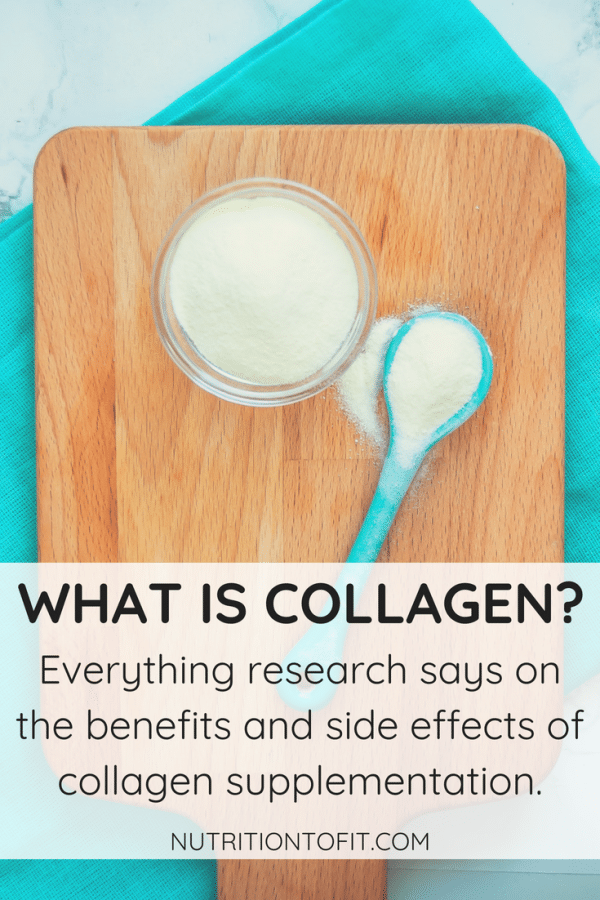

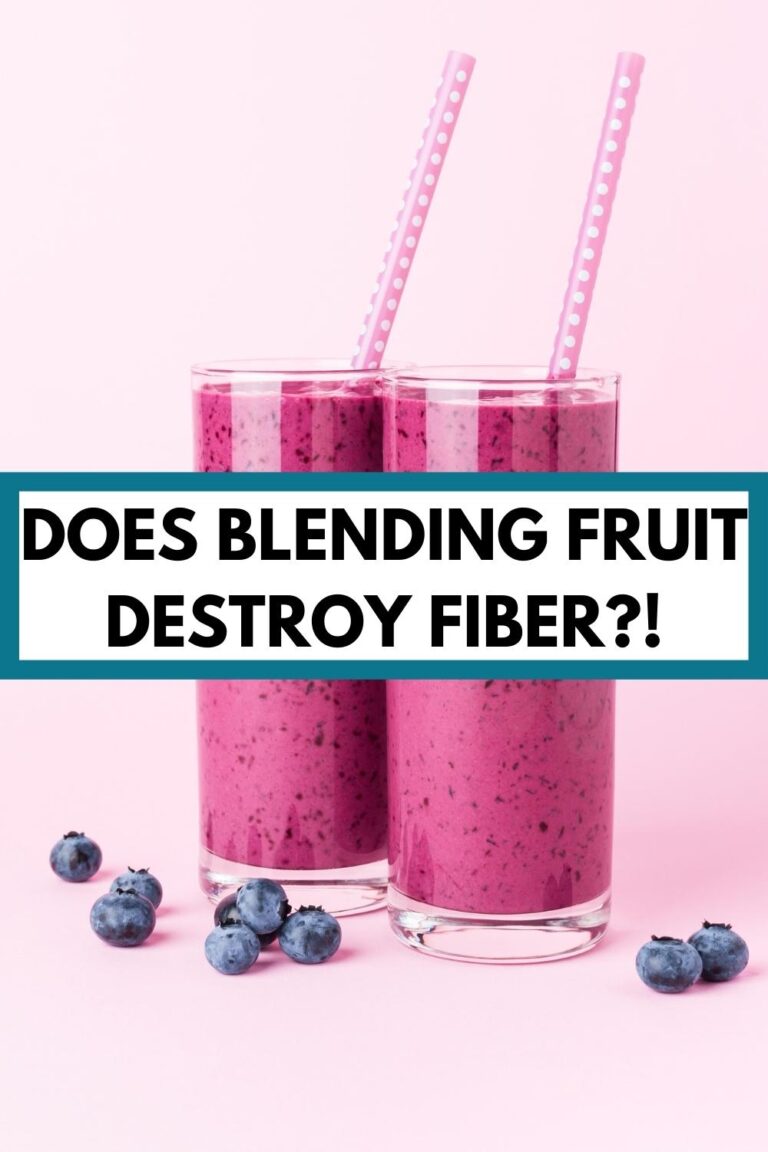


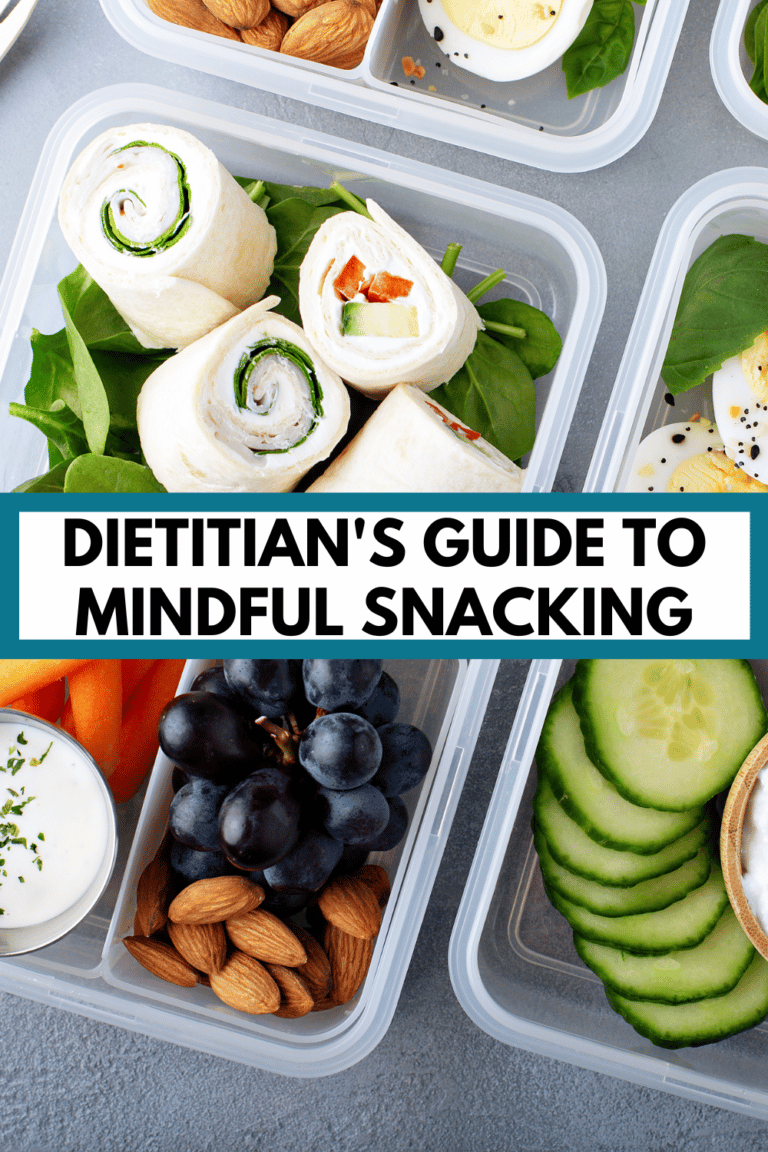


Good article!
Do you think collagen peptides would increase the rate of cancer growth?
Hi Nancy! Thank you for your question, this is a super intriguing topic, and in full transparency, one I’m not an expert in. I’ve briefly reviewed several research articles and while there is MUCH more research needed in this area, it looks like there may be some thought that collagen could play roles in both promoting and limiting tumor progression at different cancer stages. But it’s SUPER important to also note that this is just looking at the collagen in our bodies – not ingested collagen peptides. And like I stated in the article, “Digestion breaks collagen supplements down into amino acids that may be used to help collagen production, or may be used elsewhere in your body.” –> meaning the collagen consumed in collagen peptides doesn’t automatically add to collagen stores in your body.
All that said, this is a super interesting topic and one I’d love to see more research for! If anyone has cancer, I would HIGHLY recommend discussing collagen peptide supplementation (and any supplementation or dietary protocols for that matter) with your oncologist.
I notice I started to get hormonal acne after taking collagen for 3 days I use the brand vital peptides… I also notice a pain in my legs they feel soo heavy and achy… those that mean I’m allergic to it or it’s just a starting phase ?
Hi Krizia. If you’re experiencing any negative effects, I would stop and consult with your doctor/ healthcare team. Beyond that, I can’t provide any individualized advice to individuals who are not my clients (as I don’t know full background/ history/ picture, etc.). Best of luck. <3
I am noticing my hair is not acting right and when I blow dried it a lot of fall out . I’m a hair stylist so I know these things . Also I have a pimple so I’m thinking not for me .
Is it possible that powdered porcine collagen can increase sun sensitivity? I am not on any medications and take only fish oil, biotin, and collagen vitamins. I’m trying to deduce the cause of my recent itchy rashes after sun exposure (even with my regular SPF 50).
I would consult with your doctor – there could be a number of reasons!
I know I’m late to this discussion…but why do they say Collagen is bad for people with hypertension but then reading further along it’s said that Collagen actually is good for the heart and blood vessels?
I just found this article also. I’ve begun massive joint pain 2 weeks after starting a new collagen powder (blue can of vital proteins). Googled can collagen cause joint pain….. so I’m here. I have been getting lots of spurs lately. So can hypercalcemia be me? Gonna see the dr. Soon…..
Unfortunately I can’t provide individualized advice in the comments, but I absolutely agree to talk with your dr soon! And if there’s any question, maybe stop taking it until you get a chance to talk to your dr. Good luck, Angela!
I have Diebetic blood pressure and cholesterol. And I am on meds. Is it okay to take collagen powder.
I can’t provide individualized advice in the comments – I’d suggest bringing it up with your doctor/ provider who knows everything about your health to see if it would be appropriate.
I suffer from Dupuytren’s contracture
Would taking collagen supplements make symptoms worse?
Hi Peter. I can’t provide any individualized nutrition advice in comments. And unfortunately I have not seen any research about collagen and Dupuytren’s contracture. Best of luck!
Is diarrhea a side effect of taking collagen!
It can be for some!
Ho. Do you know any studies regarding the best moment of the day to take the collagen supliments? On most products i saw is recommended to take it before sleep but i don’t know why.
I haven’t seen any studies indicating a clear best time of day for taking collagen supplements. You may be seeing that recommendation as sometimes some folks anecdotally find that taking supplements before bed may help lessen any side effects (i.e. no noticeable nausea if they’re asleep 7-8 hours after taking it).